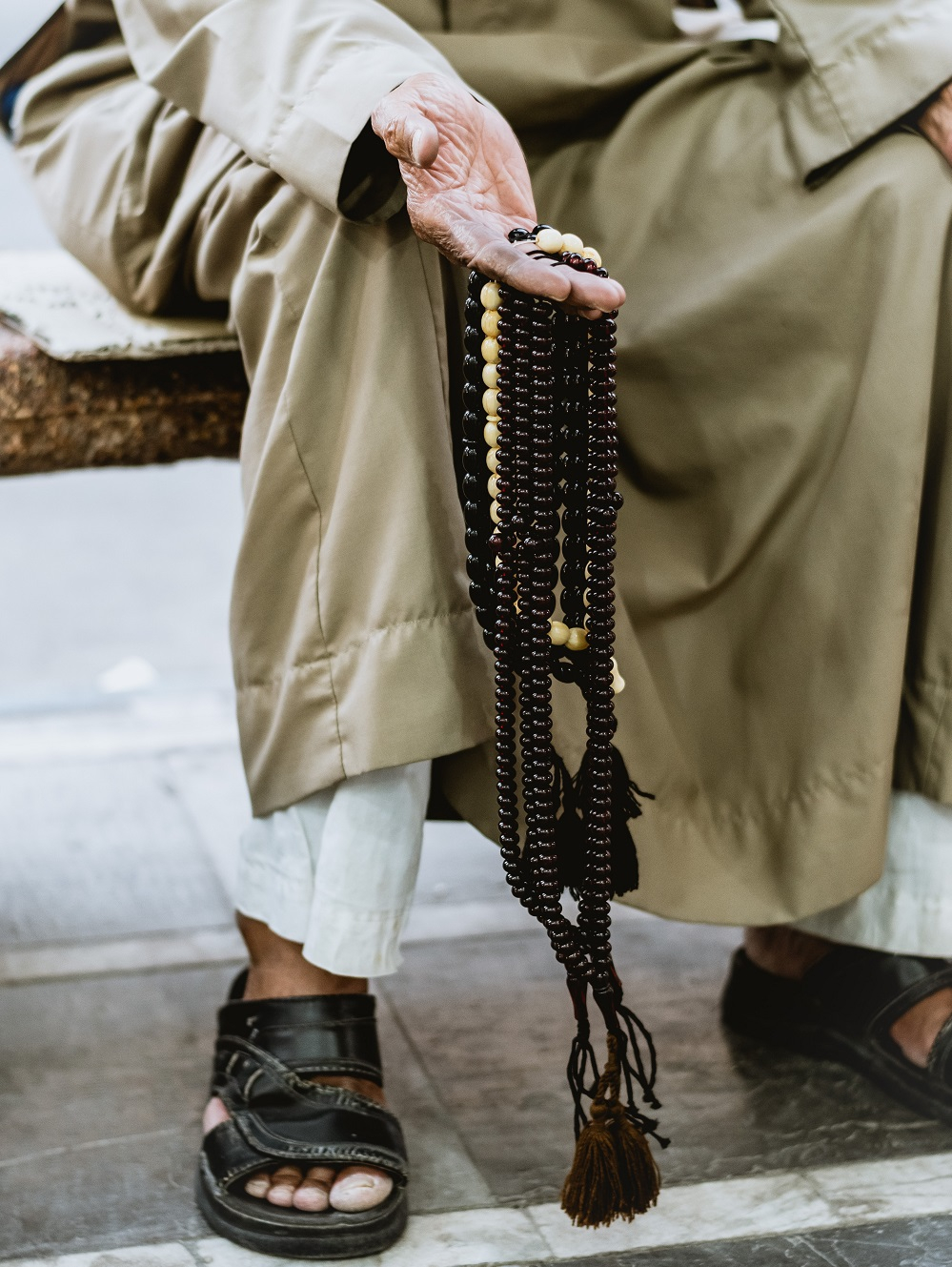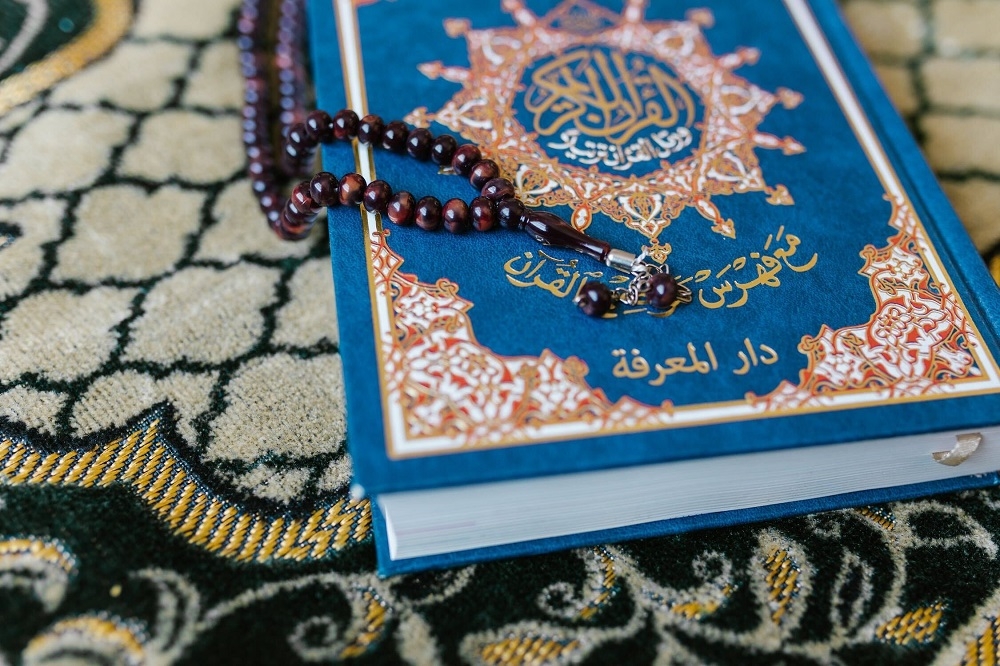The Importance of Qiyam ul Layl & How to Engage in its Worship and Prayer at Home
Faith
|
Apr 14, 2023
|
8 MIN READ

Image source: Unsplash
I slip my long black prayer hijab over me – the soft fabric waves around me as I walk through the dim house barefoot. I am calm and composed; my nerves are nowhere to be found in this moment. The world and all its demands are nonexistent.
I pass through the dark kitchen and walk down the stained steps. The creak of each step echoes louder in the silence of the night than it would during the hustle and bustle of the day in my home. I enter the small room, standing before the gray loveseat and raising my arms. No one else is up but me for Qiyam ul Layl. Tonight, I get to be alone with The Creator.
I close my eyes and begin to recite the Quran, softly at first. I slowly let the words of Allah (S) wash over me like a warm summer shower. As I progress through surah after surah, the melody begins to take shape in my head.
Time passes and soon enough, it is time for the rest of the family to rise for suhoor. The kitchen light floods the room and the sound of my family's footsteps and chattering and they search for their pre-fast meal break through the silence and peace.
I take a deep breath, feel the serenity and stillness left in my heart, and thank Allah (S) for this beautiful moment before rising from my spot of worship and climbing the stairs to prepare for another Ramadan fast.
I will be a little sleepier today. But that's okay. I have my nightly prayer and the accompanying memories to keep me going through the day.
While I may not be able to offer Qiyam ul Layl every night in Ramadan or even especially during the last ten nights of the holy fasting month, I recognize the significance of waking up in the night and worshiping Allah (S), especially during a month filled with countless blessings. We all have the opportunity to take advantage of these extra blessings by getting up and staying up during this holy month.
Let’s take a look at what Qiyam ul Layl is and what we can do during the nights of Ramadan, especially from your own home.

Image source: Pexels
Why Qiyam ul Layl?
Qiyam ul Layl is an important part of Islamic worship. It is a voluntary prayer and worship that can be performed between the Isha and Fajr prayers. Qiyam ul Layl includes tahajjud, tarawih and other acts of worship during Ramadan, and is considered a highly virtuous act of worship in Islam. Tahajjud prayers are part of Qiyam ul Layl, but Qiyam is not limited to prayers and can encompass other forms of worship at night.
Allah (S)) commanded the Prophet Muhammad (peace be upon him) to get up at night for prayer, and He mentions the night prayer in the Quran:
O you who wraps himself [in clothing], arise [to pray] the night, except for a little – Half of it – or subtract from it a little Or add to it, and recite the Quran with measured recitation.
Quran, 73:1-4
These verses are known as the ayat of Qiyam ul Layl (the verses of standing at night), and they encourage Muslims to get up at night for prayer, particularly for the tahajjud prayer.
The Prophet Muhammad (saw) was known to regularly get up at night for prayer, which is considered highly virtuous in Islam. The Prophet's nightly prayers were so beloved to Allah (S) that He (S) mentions it in the Quran
Indeed, your Lord knows, [O Muhammad], that you stand [in prayer] almost two-thirds of the night or half of it or a third of it, and [so do] a group of those with you.
Quran, 73:20
This verse is a testament to the Prophet's dedication to worship and his love for Allah (God). It also reminds Muslims to follow his example and strive to increase their worship and devotion to Allah.
Allah (S) also mentions Qiyam ul Layl and believers many times in the Quran. Allah says:
They used to sleep but little of the night, And in the hours before dawn they would ask forgiveness.
Surat adh-Dhariyaat, 51:17
And also:
Is one devoutly obedient during periods of the night, prostrating and standing [in prayer], fearing the Hereafter and hoping for the mercy of his Lord, [like one who does not]? Say, “Are those who know equal to those who do not know?” Only they will remember [who are] people of understanding.
Surah Az-Zumur 39:9
These verses convey how powerful worship in the night is in facilitating a connection with Allah, and we can easily understand why believers are encouraged to spend their nights devoted to ibadah (worship).
The Significance of Qiyam ul Layl in Ramadan

Image source: Pexels
During Ramadan, Qiyamul Layl is of particular significance because it is an excellent opportunity to increase one's worship and devotion, especially in the last ten nights of the month. The Prophet Muhammad (saw) used to perform Qiyamul Layl regularly, and he would increase his worship during Ramadan.
So how does the schedule of fasting and praying typically go? In Ramadan, Muslims wake up early in the morning to have a pre-dawn meal (suhoor) and then fast throughout the day until sunset. In the evening, Muslims break their fast (iftar) and perform the Maghrib prayer. After Maghrib, Muslims may rest for a while before performing the Isha prayer.
After Isha prayer, Muslims can perform the tarawih prayer (though we are not obligated to), which is a special congregational prayer that is only offered during Ramadan. After tarawih, Muslims can perform Qiyam ul Layl, which is also highly recommended.
(Did you know that although it is preferable to perform tarawih prayers in congregation at a masjid, you can also perform it at home?)
How to Do Qiyam ul Layl at Home
It is not necessarily better to pray Qiyam ul Layl at home or the masjid; both options have their benefits and rewards.
Praying Qiyam ul Layl at the masjid allows for greater communal worship, increasing the sense of brotherhood and sisterhood between you and your community. It also provides an opportunity to benefit from the knowledge and guidance of your imam or other scholars who may lead prayers and offer lectures and other forms of worship. In addition, praying at the masjid can provide a change of environment and help to focus one's mind on worship.
On the other hand, praying Qiyam ul Layl at home allows for greater privacy and the ability to customize the prayer to one's schedule and preferences. It can be more convenient for those who have family or caregiving responsibilities or work obligations that may make it difficult to attend the mosque. Additionally, praying at home can provide a more relaxed and comfortable atmosphere, facilitating deeper concentration and reflection in worship.

Image source: Pexels
While offering Qiyam ul Layl in the masjid is great, it may not be practical for everyone. Many people prefer offering prayer at home as they don't have to worry about traveling or finding a place in the masjid. People who care for young children, loved ones with disabilities or elderly parents may also find it more convenient to stay home. Maybe you are able to better connect with Allah (S) from home. Work can also prove challenging if your job requires you to work during the scheduled prayer times at your local masjid or if you need to maintain your daytime work schedule and cannot spend your entire night at the mosque.
If you decide to stay up for night worship (and it’s highly recommended you spend at least part of the nights in Ramadan, especially during the last ten nights doing Qiyam ul Layl), here are eight things you can do:
1. Get Familial Support: Getting the support of your family in making Qiyam ul Layl can help to create a positive and encouraging environment for worship. If other members of your family also plan to do Qiyam ul Layl, coordinate the best time for Qiyam ul Layl prayer and worship activities that works for everyone's schedule. Plan meals and other obligations to avoid any conflicts. If you plan to stay up longer for Qiyam ul Layl, and perhaps have babies or young children who may wake in the night, talk to your spouse about trading off childcare duties so you can attend to your worship.
2. Set the tone: Setting a suitable atmosphere for Qiyam ul Layl prayer can create a conducive environment for worship and increase one's focus and concentration. Choose a place in your home that is free from distractions and noise. Keep the area clean and tidy, and avoid any clutter or unnecessary items that may be distracting. Use soft, dim lighting to create a peaceful atmosphere. Avoid bright lights that may be harsh on the eyes and disrupt concentration. Dress in comfortable, clean and modest clothing that is suitable for prayer. Turn off or silence your phone and any other electronic devices to avoid any distractions.
Making your surroundings conducive for Qiyam ul Layl shouldn't be a daunting task. Do what comes easy to you! Whether organizing your space, setting up a cozy prayer corner, or simplifying your routines, every effort counts.
3. Offer the tahajjud prayer: The primary purpose of staying up during Qiyamul Layla is to perform the tahajjud prayer. It is a voluntary prayer performed in the last third of the night and is considered a very virtuous act of worship.
4. Recite the Quran: Spend some time reciting and reflecting on the verses of the Quran. This is a great way to increase your knowledge and strengthen your faith.

Image source: Pexels
5. Make du’a: Qiyam ul Layla is an excellent time to make du'a (supplication) to Allah (S). You can ask for forgiveness, guidance, and blessings for yourself and others. Check out my fellow Haute Take writer Danah Shuli’s piece on how to gather your thoughts to make du’a.
6. Engage in dhikr: Dhikr refers to the remembrance of Allah (S) through the repetition of certain phrases. This can include reciting the 99 names of Allah or saying SubhanAllah (Glory be to Allah), Alhamdulillah (All praise is due to Allah), and Allahu Akbar (Allah is the greatest). Another form of dhikr is reciting darood sharif, which are various short du’as that send blessings upon the Prophet Muhammad (saw).
7. Learn about Islam: Use this time to increase your knowledge about Islam. You can read Islamic books or listen to lectures and podcasts.
Fortunately, many Islamic institutions and scholars are offering online Ramadan lecture series that can help lift spirits and provide inspiration during this holy month. (Here are 15 great ones you can check out.) Whether you're looking for guidance on how to make the most of your fast or simply seeking knowledge about Islam, these lectures will surely provide valuable insights that will enrich your experience of Ramadan.
8. Make plans for charity: Qiyam ul Layla is a great time to reflect on your blessings and make plans to help those less fortunate. Consider donating to charity (it’s so easy to do so online during the night) or making plans for volunteering your time to help those in need.
Qiyam ul Layla is an excellent opportunity to increase your worship and devotion to Allah (S). Don’t be intimidated by the prospect of staying up until suhoor. But at the same time, push yourself. These are the most special nights in the whole year to beseech Allah (S), connect with Him and reap the rewards of sacrificing your sleep and comfort to worship He who is most merciful, most forgiving, the most loving.
If you’re exhausted by your children or other responsibilities, don’t despair. Do whatever you can for whatever time you can spareto engage in QIyamul Layl. Every little bit is worth so much, because Allah (S) knows our hearts and struggles. And by performing the tahajjud prayer and engaging in other acts of worship, you can, Insha’Allah, strengthen your faith and improve your spiritual connection.
May we all reap the barakah and blessings of these last blessed days and nights of Ramadan. Ameen!
Subscribe to be the first to know about new product releases, styling ideas and more.
What products are you interested in?

